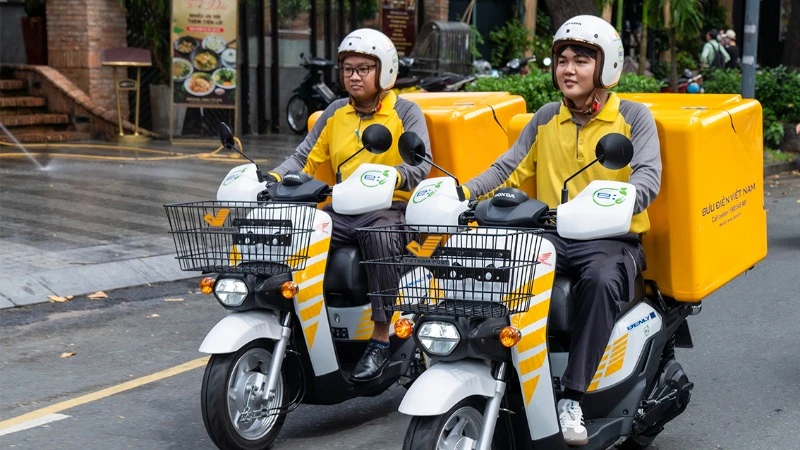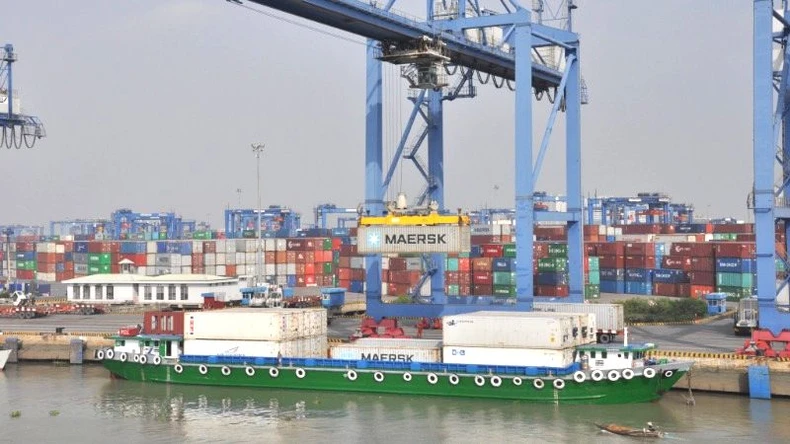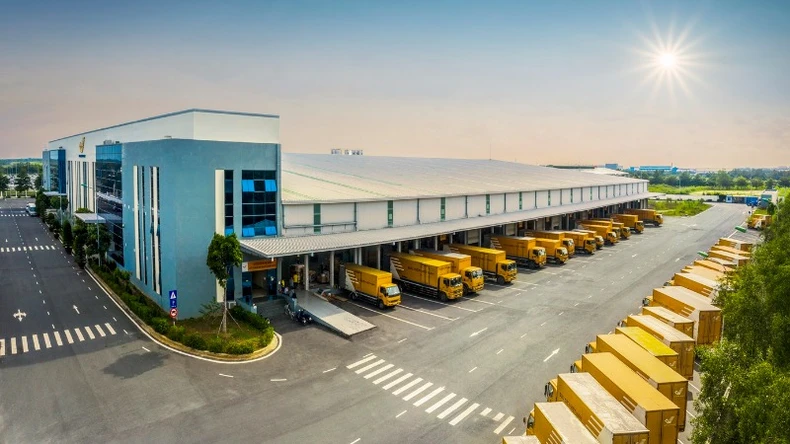“Green Transformation” in Logistics Services
vlimonamedia
17/02/2025
The green transformation is considered an essential step for logistics service providers to enhance their competitive edge.

Vietnam Post Pioneers Green Logistics Solutions
As one of the leading enterprises in Vietnam’s logistics industry, Vietnam Post has actively implemented numerous initiatives to promote environmentally friendly logistics operations.
Since 2019, Vietnam Post has launched the Postgreen Project to build a sustainable and eco-friendly postal environment. This initiative includes measures such as eliminating single-use plastic items in offices, sorting facilities, and transportation vehicles.
Additionally, Vietnam Post has initiated the “Green Office” movement and redesigned post offices to create a more customer-friendly environment. The company also encourages customers to switch from plastic packaging to standardized cardboard boxes, ensuring both safety and environmental sustainability.
Notably, in 2021, Vietnam Post became the first postal enterprise in Vietnam to collaborate with Honda Vietnam in adopting electric motorcycles for delivery operations, further reinforcing its commitment to green transformation.
Unlocking Growth Opportunities for the Logistics Industry
Vietnam Post’s efforts in innovation, service improvement, digitalization, and green transformation have significantly contributed to elevating Vietnam’s Postal Development Index from Level 5 to Level 6, positioning the country among those with strong postal development.
According to Mr. Dao Trong Khoa, Chairman of the Vietnam Logistics Business Association (VLA), climate change is one of the greatest global challenges of the 21st century. The logistics sector contributes significantly to carbon emissions, accounting for an estimated 7-8% of total CO2 emissions. This has led to an increasing awareness of green logistics within the Vietnamese business community.

“Many enterprises within the Vietnam Logistics Business Association (VLA) have proactively adopted environmentally friendly solutions such as low-emission transportation, digital technology for route optimization, and fuel efficiency improvements. Some member companies have even obtained international green certifications for their seaports, while others have begun carbon emission audits and participated in carbon credit markets. However, the adoption of green logistics remains limited in scale and is not yet widespread in Vietnam, which is still in the early stages of this transition,” Mr. Khoa stated.
Green Transition to Enhance Competitiveness
Despite some pioneers in the green transition, a large number of logistics companies in Vietnam have yet to embrace sustainability. According to the Ministry of Industry and Trade, only a small fraction of the over 34,000 logistics companies in the country have actively implemented green transformation initiatives.
A survey conducted by the Vietnam Logistics Research and Development Institute (VLI) from August 2023 to July 2024 revealed some concerning findings. While awareness of green logistics is increasing, most businesses have yet to commit to substantial environmental actions.
Specifically, 12.5% of surveyed companies had not implemented any green policies or practices, while 87.5% had plans to adopt sustainable solutions. However, the majority had not set specific timelines for their commitments. Notably, 65.63% of logistics service providers had not yet applied environmental impact reduction measures, whereas only 34.37% had either implemented or planned green initiatives.
Solutions to Drive Logistics Growth
Vietnam’s logistics sector remains heavily dependent on road transportation, which is unevenly developed compared to other transport modes. Currently, 75% of goods are transported by road, 12% by sea, and only 2% by rail. Moreover, 95% of Vietnam’s transport vehicles still rely on fossil fuels.
E-commerce is also expanding rapidly in Vietnam, increasing the demand for logistics services. However, e-commerce-related logistics activities contribute significantly to greenhouse gas emissions and environmental pollution. Additionally, packaging and delivery processes in online retail generate excessive waste, including single-use plastics and cartons.
The high volume of delivery vehicles—ranging from trucks to motorcycles—operating daily to fulfill online orders further exacerbates carbon emissions. This impact is even more pronounced in express delivery services.
Strategic Directions for Green Transition

As part of Vietnam’s commitment to achieving net-zero emissions by 2050 under the COP26 framework, green logistics and emission reduction have become integral components of sustainable supply chains. However, transitioning to green logistics presents challenges, particularly for small and medium-sized enterprises (SMEs).
One major challenge is the human factor, including awareness and the ability to adapt to green logistics requirements. Additionally, Vietnam’s transportation infrastructure remains incomplete, especially in remote areas. Cost considerations also pose a significant concern for businesses.
According to Mr. Pham Thien An, Director of Vinacontrol Inspection Company, the government has introduced various policies to support businesses, including participation in the carbon credit market. This financial mechanism can serve as a valuable tool for companies transitioning to green logistics.
To achieve effective carbon reduction, businesses must develop clear, precise, and actionable greenhouse gas mitigation strategies.
Addressing Bottlenecks in Vietnam’s Logistics Sector
To advance green logistics, companies should invest in eco-friendly transportation technologies such as electric vehicles, hybrid trucks, and fuel-efficient solutions. They should also develop intermodal transport systems that integrate road, sea, and rail networks and leverage digital supply chain solutions for optimized logistics operations.
Furthermore, businesses should promote the use of sustainable fuels (e.g., biofuels), strengthen international cooperation, and engage in carbon offset projects.
To enhance the competitiveness of Vietnam’s logistics sector, the country will host the FIATA World Congress 2025 in October 2025. This prestigious event will bring together global experts and leading logistics enterprises to discuss the theme of “Green and Resilient Logistics.”
The congress will not only reaffirm Vietnam’s strong commitment to sustainable logistics but also provide a platform for industry stakeholders to explore new trends, learn from global best practices, and foster international collaboration.
As a key industry event, the FIATA World Congress 2025 will connect domestic and international experts and businesses, accelerating the green transition in logistics and contributing to a more competitive and sustainable economy.
(Source: nhandan.vn)
Tag




